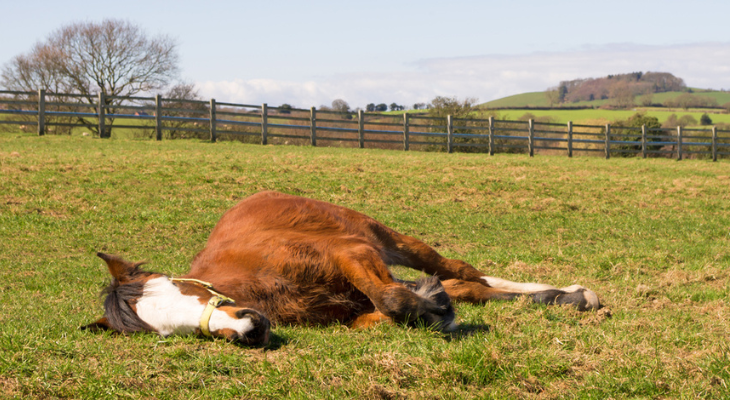
Does Your Horse Have Arthritis?
Arthritis, a disease that affects the joints, causes pain and stiffness in your horse's legs, shoulders, spine, or neck. Luckily, medication and a few modifications can ease arthritis pain and improve mobility.
Arthritis Symptoms
Arthritis affects the cartilage that cushions the ends of bones. Cartilage helps the bones in a joint move together smoothly and serves as a shock absorber. Osteoarthritis deteriorates and wears away cartilage, causing bones to rub together painfully as your horse moves. An injury or years of wear and tear may trigger inflammation that damages the cartilage.
Poor conformation or hoof care can increase your horse's risk for arthritis by causing uneven weight loading throughout the joints, according to The Horse. Horses involved in racing, trail riding, jumping, and other activities that stress the joints are more likely to develop arthritis.
Symptoms of arthritis include:
- Stiffness
- Shortened Stride
- Swollen, Stiff Joints
- Gait Changes
- Lameness
- Reluctance to Walk or Jump
- Cracking Sounds When Moving a Joint
Helping a Horse with Arthritis
If your horse is diagnosed with arthritis, your equine veterinarian may recommend one or more of these treatments or modifications:
- Anti-Inflammatory Medication. Nonsteroidal anti-inflammatory medication (NSAIDs) reduces pain, swelling, and stiffness. Since NSAIDs can cause stomach ulcers, it's important to follow your veterinarian's dosing instructions before giving them to your horse.
- Corticosteroid Injections. Injecting corticosteroids into an arthritic joint eases pain and inflammation and may slow deterioration in the joint. Corticosteroids may be given every six to 12 months.
- Hyaluronic Acid and Polysulfated Glycosaminoglycans (PSAGs) Injections. Hyaluronic acid helps thicken the synovial fluid that lubricates the joints and decreases inflammation. PSAGs injections reduce inflammation, spur repair of the cartilage, and boost synovial fluid production.
- Joint Fusion. When other treatments don't relieve your horse's symptoms, your veterinarian may suggest fusing the bones in a joint to relieve pain.
- Gentle Exercise. Although your horse may be reluctant to move at first, movement reduces stiffness and may ease pain. Moderate exercise strengthens the muscles that support the joints and improves synovial fluid circulation. Daily walks may help a horse with mild to moderate arthritis stay in shape and decrease symptoms. Limit walks to flat, soft surfaces and avoid hills, rocky terrain, or trails that include sharp turns. If arthritis is severe, turnout might be all the exercise your horse can handle. No matter what type of exercise you choose, adequate warm-up and cool-down times are essential.
- Regular Farrier Visits. Unbalanced feet can stress the joints and increase arthritis pain. Scheduling regular trims and using pads under shoes or opting for special shoes that reduce pressure offer simple ways to keep your horse comfortable.
- Weight Management. The heavier your horse, the more stress on the joints. Unfortunately, horses tend to gain weight as they become less active. According to The Horse, it's a good idea to aim for a body condition score of four to six on the nine-point Henneke scale if your horse has arthritis. Your equine veterinarian can provide weight loss recommendations that will help your horse lose weight without sacrificing the nutrients needed for good health.
Are you worried that your horse may have arthritis? Give our office a call to schedule a visit with an equine veterinarian.
Sources:
The Horse: Conditioning Arthritic Horses: Do’s and Don’ts, 4/8/2022
https://thehorse.com/187286/conditioning-arthritic-horses-dos-and-donts/
Equus: Coping with Arthritis in Horses, 6/25/2021
https://equusmagazine.com/horse-care/coping-with-arthritis-in-horses/
Practical Horseman: Diagnosing Arthritis, 9/2/2022
https://practicalhorsemanmag.com/health-archive/does-my-horse-have-arthritis/
University of Illinois Urbana-Champaign College of Veterinary Medicine: Caring for Older Horses, 12/7/2018
